
The head of medical charity Médecins Sans Frontières on Monday criticized the U.S. government after it altered its narrative of what led to an airstrike in Afghanistan on Saturday that caused "collateral damage" to a hospital clinic and killed 22 people.
The bombing of the hospital killed 12 staff members and 10 patients, three of whom were children, according to Médecins Sans Frontières (MSF), which is known as Doctors Without Borders in English. Some 37 people, including 19 staff, were also injured, MSF said.
The U.S. military had said it carried out an airstrike in the vicinity of the hospital around 2:15 a.m. local time against insurgents who were firing directly on American service members.
On Monday, however, the commander of U.S. forces in Afghanistan, Gen. John F. Campbell, corrected that, saying it was Afghan forces who were under fire and who had requested the strike.
"Afghans asked for air support from a special forces team on the ground...[The] initial statement that went out is that U.S. forces were under direct contact fire," he said, adding he is "correcting that statement."
He would not comment on who authorized the airstrike, citing an ongoing investigation, but said he had not suspended military support to local Afghan forces.
Over the weekend, a U.S. military spokesman announced they were investigating the incident, acknowledging the strike "may have resulted in collateral damage to a nearby medical facility."
In a statement Monday, MSF General Director Christopher Stokes said there was no justification for the attack.
"Their description of the attack keeps changing – from collateral damage, to a tragic incident, to now attempting to pass responsibility to the Afghanistan government," Stokes said. "The reality is the U.S. dropped those bombs. The U.S. hit a huge hospital full of wounded patients and MSF staff."
"With such constant discrepancies in the U.S. and Afghan accounts of what happened, the need for a full transparent independent investigation is ever more critical," he said.
MSF has described the incident as a war crime and is demanding an independent investigation.
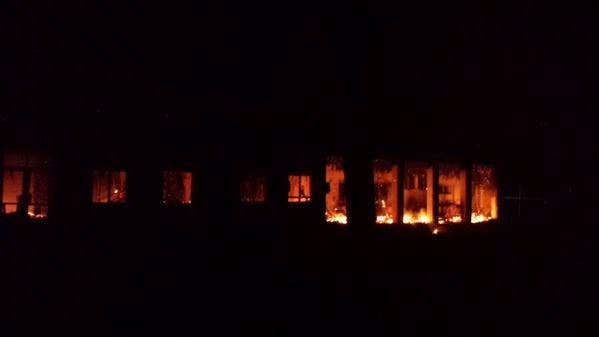
U.S. airstrikes have been taking place in the area since the Taliban seized the city of Kunduz in a multi-pronged attack on Monday.
The Afghan interior minister had said that around 15 Taliban militants were hiding in the hospital at the time of the strike, the BBC reported. The Afghan government alleged the hospital was harboring "armed terrorists" who were using the facility "as a position to target Afghan forces and civilians."
But that claim drew an outraged response from Stokes, who said it "amounted to the admission of a war crime," and that it "contradicts the initial attempts of the U.S. government to minimize the attack as 'collateral damage.'"
The MSF head also said that no hospital staff members reported fighting before the bombing occurred.
In addition, he said it appeared the main hospital building had been targeted, not a victim of collateral damage as the U.S. has claimed.
"[The hospital] was repeatedly and very precisely hit during each aerial raid, while the rest of the compound was left mostly untouched," he said.
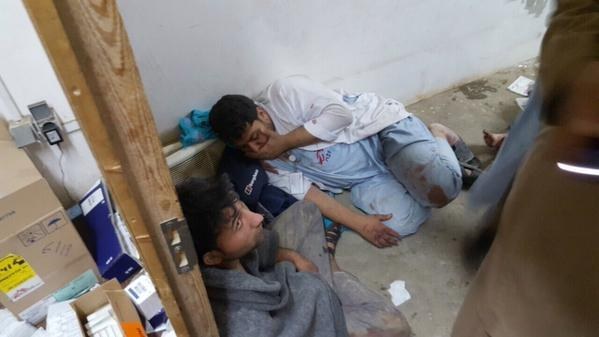
In a statement Saturday, President Obama offered condolences and "our thoughts and prayers to all of the civilians affected by this incident, their families, and loved ones."
"The Department of Defense has launched a full investigation, and we will await the results of that inquiry before making a definitive judgment as to the circumstances of this tragedy," Obama said.
Gen. Campbell said over the weekend that he had spoken with Afghan President Ashraf Ghani about the incident.
"While we work to thoroughly examine the incident and determine what happened, my thoughts and prayers are with those affected," Gen. Campbell said in a statement. "We continue to advise and assist our Afghan partners as they clear the city of Kunduz and surrounding areas of insurgents. As always, we will take all reasonable steps to protect civilians from harm."
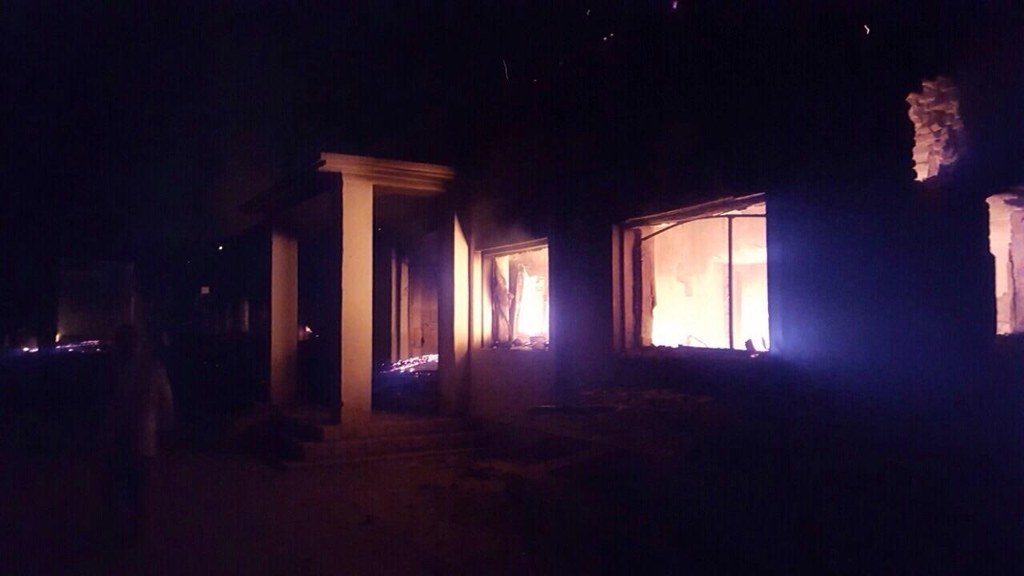
MSF said earlier that it had informed U.S. forces of the locations of its facilities in Afghanistan.
"As MSF does in all conflict contexts, these precise locations were communicated to all parties on multiple occasions over the past months, including most recently on 29 September," it said. "The bombing continued for more than 30 minutes after American and Afghan military officials in Kabul and Washington were first informed."
In an emailed statement, Heman Nagarathnam, MSF head of programs in northern Afghanistan, said staff heard bombs and the plane circle back: "There was a pause, and then more bombs hit. This happened again and again," he said.
"When I made it out from the office, the main hospital building was engulfed in flames. Those people that could had moved quickly to the building's two bunkers to seek safety. But patients who were unable to escape burned to death as they lay in their beds."
The Taliban also has denied they were the target of the strike, calling it a "deliberate" attack by "the barbaric American forces."
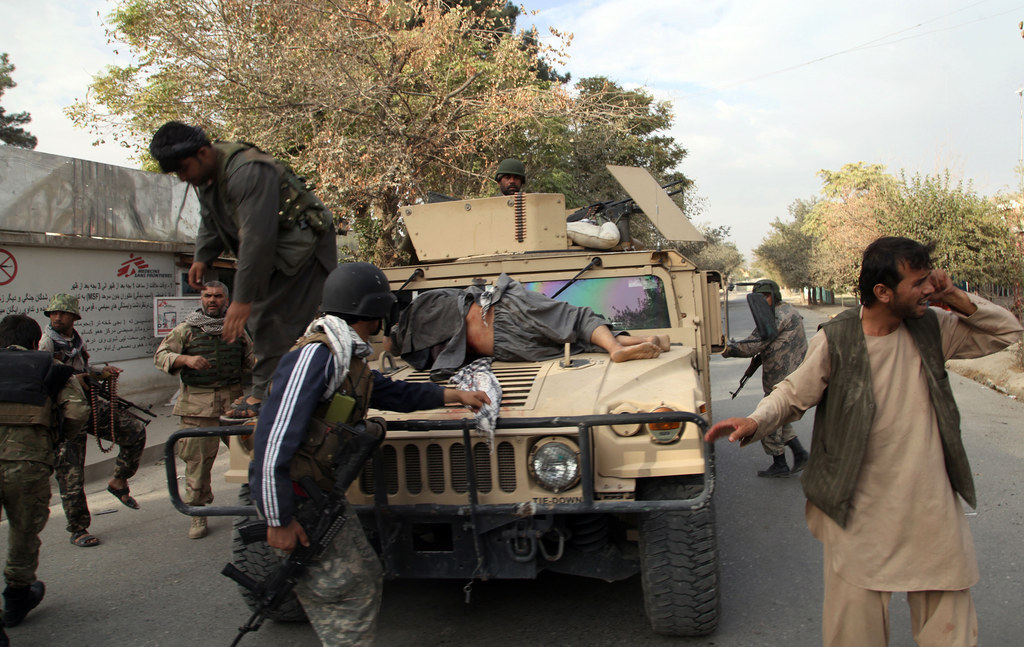
One nurse, Lajos Zoltan Jecs, described in a statement a traumatic scene of destruction after the bombing. As the dust settled, Jecs said, the nurses and doctors who were not injured searched through burning rooms and debris for the injured.
As they tried to assess the damage, they found several of their own staff were among the dead and injured.
"We did an urgent surgery for one of our doctors," the nurse said. "Unfortunately he died there on the office table. We did our best, but it wasn't enough."
Jecs had been working at the hospital for several months, and said bombs could often be heard exploding nearby.
The damage and injuries were overwhelming, Jecs said. "There are no words for how terrible it was. In the Intensive Care Unit six patients were burning in their beds."
"There were too many that we couldn't help," the nurse said. "We just treated people that needed treatment, and didn't make decisions. How could we make decisions in that sort of fear and chaos?"
Video posted to Facebook by a local radio station showed the extent of the damage to the hospital following the strike.
"Thick black smoke could be seen rising from some of the rooms," Saad Mukhtar, director of public health in Kunduz, told Reuters. "The fighting is still going on, so we had to leave."
The hospital said that there were 105 patients and caregivers in the hospital at the time of the attack.
"I was shocked, emotional, and in tears when I reached the hospital," a shopkeeper, Qiamudeen, whose neighbour was killed in the attack, told AP. "I had to get permission from Taliban insurgents blocking several parts of the city, desperately pleading with them to let me go to the hospital as my neighbour had been killed."
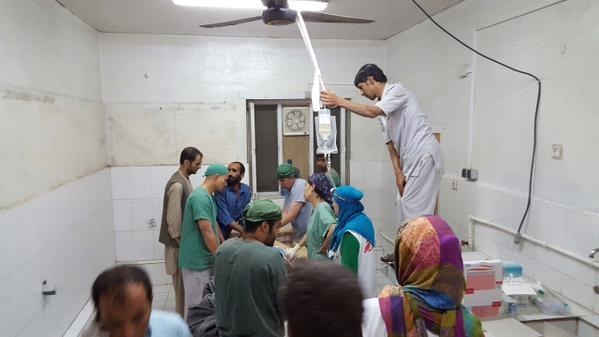
The bombing drew condemnation from several organizations dedicated to humanitarian efforts.
MSF president Meinie Nicolai said it was an "abhorrent and a grave violation of international humanitarian law."
"We demand total transparency from coalition forces," she said. "We cannot accept that this horrific loss of life will simply be dismissed as 'collateral damage.'"
The International Committee of the Red Cross called the incident an "appalling tragedy" in a statement condemning the bombing.
"Such attacks against health workers and facilities undermine the capacity of humanitarian organisations to assist the Afghan people at a time when they most urgently need it," Jean-Nicolas Marti, the head of the organisation's delegation in Afghanistan said.
EU commissioner for humanitarian aid and crisis management Christos Stylianides said in a statement that the European Commission "deplores" the deaths of several people in the bombing of the hospital:
"I call on all parties to the conflict to respect international humanitarian law and ensure that health care facilities and humanitarian workers are protected," Stylianides said.
The United Nations' head of mission in Afghanistan, Nicholas Haysom, said that a hospital should "never be the object of attack".



